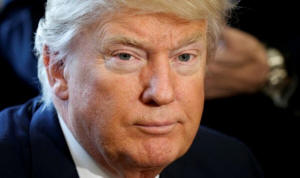|
Tale of Two Donalds: Trump gives Europe
splitting headache
 Send a link to a friend
Send a link to a friend
 [February 06, 2017]
By Alastair Macdonald [February 06, 2017]
By Alastair Macdonald
VALLETTA (Reuters) - "Our Donald", or "the
other Donald"? European Union leaders meeting in Malta found themselves
taking sides, between their summit chairman, "our Donald" Tusk, and the
new U.S. president, Donald Trump.
But despite declarations of unity, EU states are split on how to respond
to policies from a man who has reversed staunch postwar U.S. support for
European integration and suggested others follow Britain out of a bloc
he has called "a vehicle for Germany".
Tusk, a former Polish prime minister, said EU leaders gave him the "our
Donald" nickname in Malta. He presented it as a sign of their support,
saying before the summit that Trump posed a "threat" to the bloc,
alongside Russia, China and violent Islam.
"The mood in the room was 'our Donald' and 'the other Donald'," said one
person present at the talks, where Tusk also felt confident enough in
his support to confirm he wants a second term as president of the
European Council.
His political enemies in the Warsaw government publicly disavowed any
sense of unanimity behind Tusk, however, calling his criticism of Trump
a "gross abuse" and accusing him of "sowing fear" and "seeking
confrontation".

Others, less publicly, said there was wider disquiet that the EU could
turn its back on its Transatlantic relationship.
Such internal arguments pit historic unease, especially in France, over
U.S. influence against fears of weakening a Western front against Russia
and, increasingly, China. How they play out will help shape Trump's
hopes, for example, of saving U.S. money spent on NATO and shifting
world trade in Americans' favor.
They will also flavor the EU's Brexit talks with London - where Prime
Minister Theresa May sees Britain being a bridge between Washington and
Brussels - as well as efforts by some states to tighten cooperation on
euro zone economic policies and other areas, notably an independent EU
military capability.
"STRATEGIC AUTONOMY"
As a Pole well aware it is U.S. forces that underpin NATO's security
guarantees in eastern Europe, Tusk nuanced his call to Europeans to pull
together to defend their independent interests against the "superpowers,
the United States, Russia and China" with an appeal to Americans to
preserve "the Transatlantic bond without which global order and peace
cannot survive".
But some leaders worry Trump's coolness toward NATO and the exit of
well-armed Britain will fuel ambitions for Europeans to loosen that bond
- notably in Paris, which has often chafed at "Anglo-American" influence
and where officials say Trump shows France has been right to seek
"strategic autonomy" for the EU.
"The French ... are as usual saying 'It's just the European Union now;
there's no such thing as the West'," said a senior eastern European
diplomat, criticizing Paris's view.
[to top of second column] |

President Donald Trump looks up after signing an executive order
rolling back regulations from the 2010 Dodd-Frank law on Wall Street
reform at the White House in Washington February 3, 2017.
REUTERS/Kevin Lamarque

"The Germans are much more cautious. There is a clear issue to be
decided on whether we should seek a common ground to engage with the
United States, or turn our backs."
As EU leaders prepare to map out a post-Brexit strategy at a 60th
anniversary summit in Rome next month, French President Francois
Hollande criticized Trump and eastern European governments he
accused of raking in EU subsidies but then breaking ranks and
undermining the bloc by seeking special favor from Washington.
Many in the east are especially alarmed by Trump's warmer tone
toward Russia but some back his entry ban on Muslims, which echoes
their own criticisms of EU refugee policies.
German Chancellor Angela Merkel took a less confrontational tone but
stressed the need for "multilateralism" - a prod to Trump not to try
and circumvent the EU by talking only to national leaders, and to
Europeans to speak with a single voice.
Whether "the other Donald" gets that message is another matter,
given a seemingly hazy grasp on who is who in Brussels. The
tycoon-turned-president told an interviewer last month he had spoken
to "the head of the European Union" and named his interlocutor as
Jean-Claude Juncker, the EU chief executive.
In fact, however, he had spoken to "our Donald", Tusk.

"Sometimes I have an impression that the new administration does not
know the EU in detail," Juncker said drily on Friday.
"But, in Europe, details matter."
(Additional reporting by Gabriela Baczynska; Editing by Louise
Ireland)
[© 2017 Thomson Reuters. All rights
reserved.]
Copyright 2017 Reuters. All rights reserved. This material may not be published,
broadcast, rewritten or redistributed. |